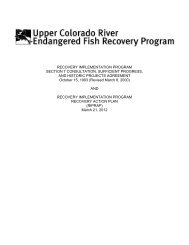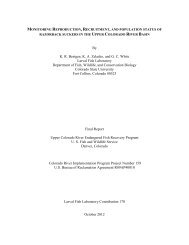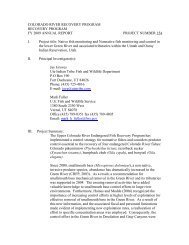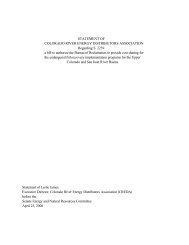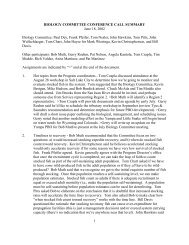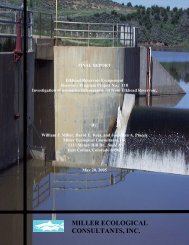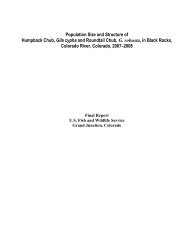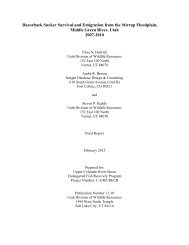Final Programmatic Biological Opinion for Bureau of Reclamation's
Final Programmatic Biological Opinion for Bureau of Reclamation's
Final Programmatic Biological Opinion for Bureau of Reclamation's
Create successful ePaper yourself
Turn your PDF publications into a flip-book with our unique Google optimized e-Paper software.
Figures 4 - 6 and Tables 4 - 6 compare a range <strong>of</strong> hydrological conditions in the 15-Mile Reach.In dry years baseline flows are typically lower than existing conditions through the winter months(November, December, January, February, and March). With future water depletions andimplementation <strong>of</strong> the recovery action items, flows are reduced to levels closer to baselineconditions and flow recommendation conditions during those months. During the spring monthsin dry years (April, May, and June) baseline flow conditions far exceed flow recommendations andexisting conditions. During the late summer and fall months baseline flows exceed all flowconditions. However, the implementation <strong>of</strong> recovery action items, with future depletions willprovide flows that meet the flow recommendations during August September and October.During average years, baseline flows are lower than existing flows during winter months andexceed existing flows the rest <strong>of</strong> the year. During late summer and fall, conditions with futuredepletions and implementation <strong>of</strong> the recovery actions will maintain flows close to the flowrecommendation. During the spring months (April, May, and June) baseline flow conditionsexceed flow recommendations and existing conditions. However, these figures and tables do notinclude the flows provided by Coordinated Reservoir Operations or Coordinated FacilitiesStudies, because the model uses average monthly flows which do not reflect flows provided bythese two recovery items designed to augment spring peak flows. Coordinated ReservoirOperations augment the spring peak during below average, average, and above average years, butnot during dry or wet years.During wet years, baseline flows are lower than existing flows in most winter months and exceedexisting flows the rest <strong>of</strong> the year. In wet years, conditions with future depletions andimplementation <strong>of</strong> recovery actions are close to flow recommendations during the run<strong>of</strong>f months.In wet years, reservoirs fill quickly and the diversions are minor compared to the total volume <strong>of</strong>flow. During late summer and fall future conditions meet or exceed the flow recommendations.Augmentation <strong>of</strong> Late Summer and Fall Base FlowsA number <strong>of</strong> actions will provide water to the 15-Mile Reach during July, August, and September.It is important to augment flows during these months in the 15-Mile Reach because this is whenthis reach can be extremely dewatered due to agricultural diversions. The CWCB administers aninstream flow right <strong>of</strong> 581 cfs in the 15-Mile Reach which protects the water released from theOrchard Mesa Power Plant and the Orchard Mesa Irrigation District Pump Station. They alsoadminister an instream flow right <strong>for</strong> 300 cfs <strong>of</strong> accretions to the 15-Mile Reach during July,August, and September. These flow rights would ensure protection <strong>of</strong> some existing flows in the15-Mile Reach.Release <strong>of</strong> 5,000 acre-feet annually plus an additional 5,000 acre-feet 4 out <strong>of</strong> 5 years from RuediReservoir also would provide water to the 15-Mile Reach during July, August, and September. Inaddition, the leases <strong>for</strong> release <strong>of</strong> 10,825 acre-feet/year <strong>of</strong> water from Ruedi Reservoir and thepermanent dedication <strong>of</strong> 10,825 acre-feet/year <strong>of</strong> water from Colorado Water Division Number 5Facilities will be delivered and protected to the 15-Mile Reach during the late summer period.47



